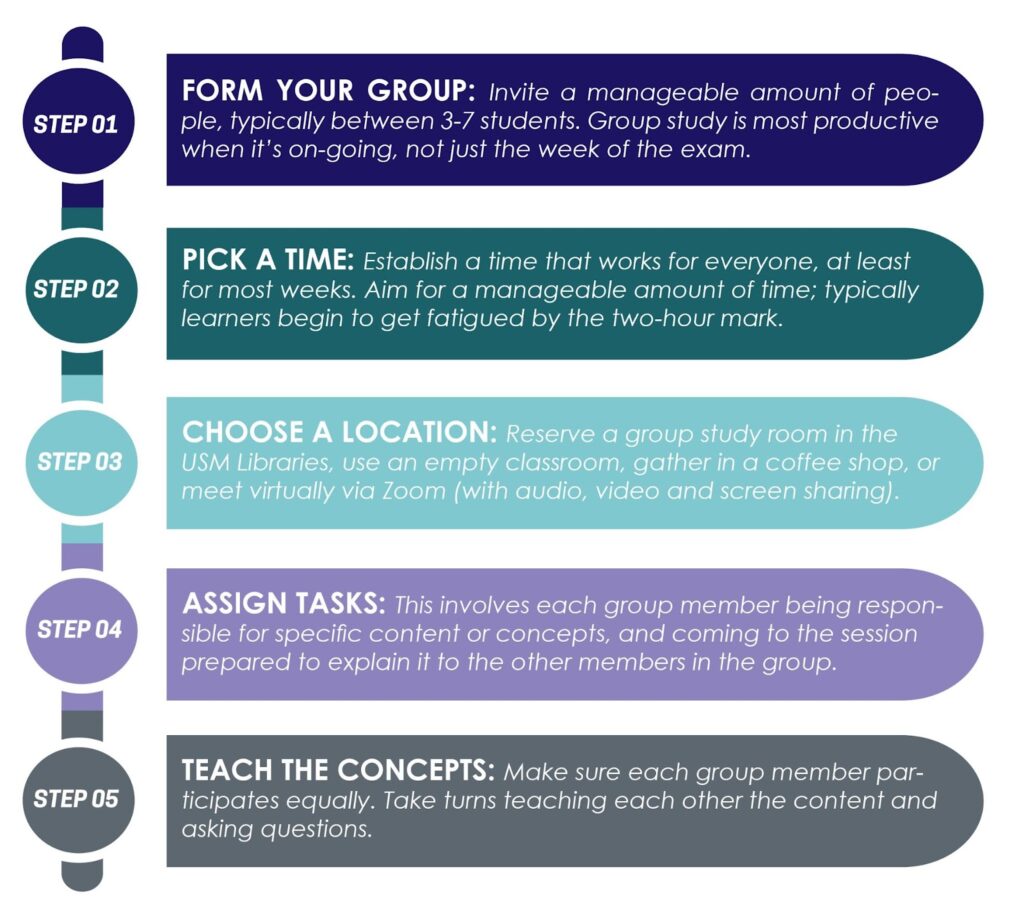Group L members: Steven Luo, Ming Yang, Ri Zhou, Oliver Meng
Why is group study important in university?

Overview
The application of the teaching mode of group study injects vitality into classroom teaching. It not only gives full play to the function of mutual collaboration between teachers and students, but also cultivates students’ sense of cooperation and team spirit, allowing them to change from passive learning to active learning, thus promoting cooperation among groups, stimulating learning enthusiasm, tapping individual learning potential, increasing the amount of information, and enabling students to improve together in a complementary promotion.
The main idea is to compare the difference between individual and group studies at university. Three aspects are examined: why group study is important, how to achieve good group study, and what benefit group study can bring to us.

Lesson Objectives
By the end of this week you will be able to:
- Learn to use online tools for group studying
- Complete a project as a group
- Enhancing Collaboration Capabilities
- Develop a set of strategies for future group learning
Read/Watch
Videos
How to Make Group Study Sessions Actually Work (4 min)
The Benefits of Study Groups (3 min)
Starting a Study Group (3 min)
How to study in groups (8 min)
Resources
10 Reasons Why You Should Form a Study Group
Implementing Group Work in the Classroom

Why study in groups?
There are a lot of benefits to studying with other people, including the following:
- You can help each other understand the material.
People understand and explain material differently. Your group members might be able to explain a concept in a way that makes more sense to you or share a trick to remember information.
- You might learn better in a group.
- Some people understand and remember information better when they can talk about it with other people.
- It forces you to stay on top of your material.
- At the very least, you are committing to studying with your group. Depending on the structure of your meeting, you may need to catch up on readings or notes before you meet in order to contribute.
You can build friendships. It’s a chance to get together with people in your program and form relationships. Group studies not only benefit your study career but also build social connections.
How to do effective group learning?

Understanding the essence of cooperative learning is a prerequisite for effective cooperative learning in classroom teaching. In cooperative Spatial and Temporal Contiguity Learning, individual success can only be achieved if the group succeeds, i.eThe real achievement of individual goals depends on the realization of the group’s collective goals.
Focus on the learning process
Focusing on the results and neglecting the process, focusing only on the final results of group learning will lead to unsatisfactory overall group learning and is an important reason why most members cannot keep up with the progress.
Application
In order to understand the meaning of group learning, students should regularly attend online synchronous meetings and schedule in-school meet-and-greet discussions, and it is necessary to maintain an awareness of the differences between individual self-study and group learning. In this way, the benefits of group learning can be felt. In addition, weekly group leaders, chosen on a rotating system, should enhance the monitoring of the progress of cooperative group learning.
Reflection
- Reflect on the difference between group and individual learning, analyze it in terms of both learning efficiency and motivation, and relate it to the theory of knowledge previously studied.
- What would happen if there was no group study at all in college?
- Will there be an equity issue within the group if the segregation of roles is not properly handled?
To Do This Week
- build a learning pod with your classmates
- set up a meeting time & communication way( can be either online or face to face) with your group mates
- Schedule the first meet-up or online synchronous meeting to introduce yourself to each other and get acquainted with the group.
- Agreement specifying the division of effort of the group
Theories and Principles
- Mayer’s design principles
When we used Canva to create the video and infographic for this lesson, we followed Mayer’s principles and tried to keep the text in the video and infographic as small as possible according to the cognitive load theory. And according to the signaling principle, we placed the most important parts of each page in a prominent position. Finally, we focused on alignment and color optimization to make it as easy as possible for readers to read.
- First Principles of Instruction
In our video, we present an example of a friend of ours who has improved his grades through group study. We designed this learning in lesson based on Merrill’s idea that ” just the use of media and multimedia doesn’t promote learning. it’s how you use them that counts.” We are committed to enabling learners to apply what they learn in class to reality.
- Mayer’s Segmenting Principle
We used Mayer’s Segmenting Principle in our design, and we kept our videos under 5 minutes to make it easier for learners to remember the video content.
References
MrStudyTV. (2019, May 28). How to make group study sessions actually work. YouTube. Retrieved December 4, 2022, from https://www.youtube.com/watch?v=4jhyhTrgyqA
smurfitwebteam. (2011, June 16). The benefits of study groups. YouTube. Retrieved December 4, 2022, from https://www.youtube.com/watch?v=sKPMKRPsMW4
YouTube. (2021, March 29). How to study in groups. YouTube. Retrieved December 4, 2022, from https://www.youtube.com/watch?v=EjdzhDTVS1I&t=5s
Learning centers at YC individualized academic support for students. Learning Centers at YC – Yavapai College. (n.d.). Retrieved December 4, 2022, from https://www.yc.edu/v6/learning-center/
Implementing Group work in the classroom. Centre for Teaching Excellence. (2021, November 22). Retrieved December 4, 2022, from https://uwaterloo.ca/centre-for-teaching-excellence/teaching-resources/teaching-tips/alternatives-lecturing/group-work/implementing-group-work-classroom
Why work in groups? University of Birmingham. (n.d.). Retrieved December 4, 2022, from https://www.birmingham.ac.uk/schools/metallurgy-materials/about/cases/group-work/why.aspx
Admin. (2019, August 26). 10 reasons why you should form A study group. Florida National University. Retrieved November 6, 2022, from https://www.fnu.edu/10-reasons-form-study-group/
10+ Benefits of Study Groups. (n.d.). Retrieved December 4, 2022, from https://www.yc.edu/v6/learning-center/docs/study-group-student-benefits.pdf
YouTube. (2020, February 4). Starting a Study Group. YouTube. Retrieved November 6, 2022, from https://www.youtube.com/watch?v=mg1n6WV17Sk